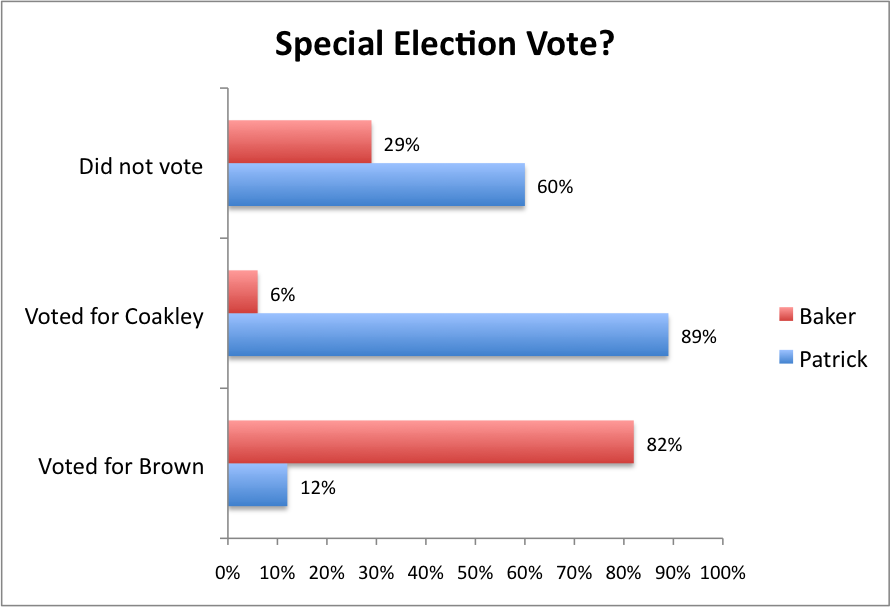Whether you want to call the 2010 midterm elections a wave or a tsunami, Scott Brown was at the leading edge of the Republican tide when he scored an unexpected victory over Martha Coakley in the January special election for Ted Kennedy's Senate seat in Massachusetts. But while Brown scored the first major Republican victory of 2010 in the blue-leaning state of Massachusetts, Republicans failed to make much in the way of additional inroads in the state in November. Democrats held on to all 10 House seats and Governor Deval Patrick won re-election over Charlie Baker. These Democratic victories raise the question: what happened to those Scott Brown supporters in this midterm election?
We conducted a statewide exit poll of Massachusetts voters on November 2nd and we asked those voters who they had voted for in the January special election. Interestingly, just 42% of Massachusetts voters said that they had cast a ballot for Scott Brown in January; 44% said that they had voted for Coakley and 12% said they had not voted in the January special election. The last statistic may be the most interesting. After all, turnout in November was only slightly higher than it had been in January. For more than one in ten November voters to have not voted in the special election had to mean that a non-trivial share of special election voters failed to come out to vote this time around. Thus, there appears to be some group of Massachusetts voters that Brown mobilized in January but whom Baker was unable to energize in November.
The chart below compares the gubernatorial votes of Brown voters to those of Coakley supporters and citizens who had not voted in January. Not surprisingly, Coakley voters became supporters of Patrick and Brown voters who turned out in November mostly cast their ballots for Baker. But where Patrick really generated his winning edge was among citizens who had not voted in the January special election. Patrick won that group by a 2-to-1 margin.

So who were these voters that stayed home in January but came out to vote in the November election? Our exit poll results show that they were almost twice as likely to be women than men. They were also more likely to be Democrats or independents and less likely to be Republicans. And these voters were also younger -- almost one in five of those who did not vote in the special election but voted in November were between the ages of 18 and 29.
Voters who did not vote in January but came out in November were also more likely to approve of Obama and disapprove of the Tea Party. Nearly 70% of November-only voters approved of the job Obama is doing as president, compared to 57% among those who voted in both elections. On the other hand, just 27% of those not voting in the special election approved of the Tea Party movement, compared to 43% for voters who turned out in both contests.
Overall, Brown voters did not appear to show up in the same numbers to support Charlie Baker in the November election. Instead, 10% of the November electorate was comprised of people who had not voted in January, and they tended to have views that were much more favorable towards Obama and the Democrats. This allowed Democrats in Massachusetts to do fairly well despite an unfavorable national electoral climate. Just ask Coakley herself how much difference 10 months made in Massachusetts. In winning re-election as Attorney General she received support from 25% of those who had voted against her in the January special election and 66% of those who had not turned out in January, winning easily as a result.